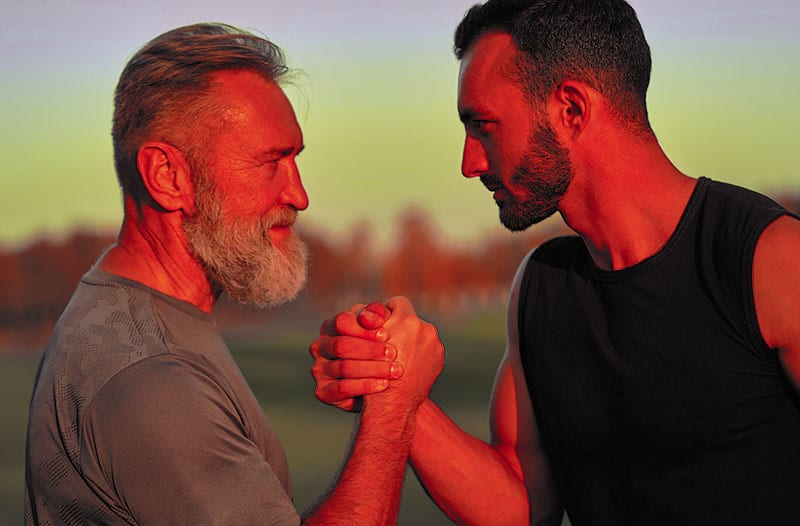 “You know you’re in love when you can’t fall asleep because reality is finally better than your dreams.” — Dr. Seuss
“You know you’re in love when you can’t fall asleep because reality is finally better than your dreams.” — Dr. Seuss
When I was diagnosed with HIV on Jan. 24, 2012, the last thing on my mind was ever having sex again, or going on a date. And finding love would be nearly impossible, I believed.
I am so glad that I was mistaken. I had sex, had dates and found a great partner.
Nothing is quite as exciting as the first season in a new relationship, with all the dates, texts, phone calls, thrilling sex, big smiles and thoughts of that person overloading one’s mind. It’s for good reason that many people refer to it as the honeymoon phase.
In the couple of relationships I have been in, the honeymoon phase lasted a lot longer than normal, according to my friends. It is either because it’s part of my personality to be really positive about new things, or I was genuinely whipped by the new beau. But I remember those periods of time sometimes more than the relationship itself.
I certainly want to remember the good times over the bad endings. I am not one to dwell long on failed relationships. But I have been known to try and stick it out in a relationship much longer than I wished I had when it was finally over.
 Damon L. Jacobs, a licensed marriage and family therapist and author of Rational Relating: The Smart Way to Stay Sane in the Crazy World of Love, agrees.
Damon L. Jacobs, a licensed marriage and family therapist and author of Rational Relating: The Smart Way to Stay Sane in the Crazy World of Love, agrees.
“Not every relationship is meant to last forever,” Jacobs states. “When a union has become toxic, damaging, stagnating and destructive, then taking a break can be the healthiest step you could take for your own and your partner’s wellness.”
But deciding when it’s time to let go of a partner and a relationship is the hardest part to determine.
We have all been in that position where we remain locked in or locked down to a partner who was literally just not meant to be our partner for a variety of reasons. And when the time finally comes around for it to end, we slowly let it go.
Holding on to a relationship that is not right for us has consequences.
“Staying can lead to depression, trauma, substance abuse, and violence,” warns Jacobs. “People sometimes stay in relationships because they think they ‘should.’ In my mind, that is the worst reason to stay with someone.”
Although it may be obvious, it’s important to mention that if a partner threatens or becomes physically violent or their uncontrollable self-destructive behavior puts the other partner in constant fear for their physical safety or mental wellbeing, it is time to move on.
But in other situations, how do you know when to finally end a relationship? Here are a few hints.
• When you keep telling yourself “no” when you should easily be saying “yes.”
Leah Steele, a spiritual life coach, says, “If you are constantly saying NO to your soul in the relationship and can’t remember the last time you said YES to it, it’s time to go!”
• When you feel like you are not heard or seen by your partner.
Meredith Quigley, a multi-state- and federally-registered conflict management specialist and mediator, believes, “When you reach a moment that your views or needs feel unheard or not respected” and “things aren’t in sync,” then it’s “time to go.”
• When your closest friends and loved ones are saying you have changed or you’re not happy anymore.
The people that you have had around you for the most important events and decisions — those you love — should have their opinions weighted in your consideration on the outcome of your relationship. If those people start speaking up, don’t ignore them. They want the best for you.
Why staying isn’t healthy
“If a relationship is not a steady source of joy, serenity and pleasure, then it’s worth questioning,” says Jacobs.
“Relationships are not prison sentences; they are not a matter of doing time.”
Steele thinks it’s really bad for us if we stay in a bad situation or relationship, and it “causes stagnation” and “affects your ability to progress and move forward, spiritually, expansively, financially and otherwise.”
Although ending a relationship is tough and takes a lot of patience and healing, allowing yourself to being open to other possibilities can help you get back in the dating game.
Whether you are looking for a hookup, date, friends with benefits or a life partner, online dating is a thing. You never know where your perfect companion is waiting for you.
If you are in an abusive relationship and want out, call The Hotline at 1-800-799-SAFE (7233) or 1-800-787-3224 (TTY), or chat at thehotline.org.
Josh Robbins is an award-winning sexual health advocate, spokesperson for DatingPositives.com, and author of the site imstilljosh.com. He was nominated for a GLAAD media award in 2017 and recently won the National Lesbian and Gay Journalist Association’s Excellence Award in the blogging category.













Damon L. Jacobs, a licensed marriage and family therapist states in his book: Rational Relating: The Smart Way to Stay Sane in the Crazy World of Love, agrees. “Not every relationship is meant to last forever,” Jacobs states. “When a union has become toxic, damaging, stagnating and destructive, then taking a break can be the healthiest step you could take for your own and your partner’s wellness.”
Perhaps what should be also added, is for the person to be very selective when choosing someone to be with, and not to ‘jump’ into relationships so fast. We are a society that demands ‘instant gratification’. Most would agree that relationships are built on, not ‘jump into bed’ with. Most in the gay community don’t wish to put in the time to make a relationship work, and at the first sight of disagreements, misunderstandings they rather flee than stay and make the relationship work. In other words: COMMITTMENT.
The one constant that this article writer seems to forget to mention is that HE is the one constant. He looks at everyone else as ‘the problem’ rather than looking at his past bad choices, and realizing perhaps the other person is to blame. It takes two to tango, so perhaps he needs to look within himself and when he begins to recognize his own short comings in each of his relationships, perhaps he can make changes to himself, instead of looking at the failures of his past relationships as ‘the other person’s fault.
Granted, there are some real jerks in the gay community who know less about relationships and commitment, but to label everything as someone else’s fault doesn’t place responsibility for the person blaming others. It’s called being a grown up, making wise decisions when entering a relationship, and most importantly finding out what the core values are of the person you are looking to date. I’m no therapist, but common sense is something that is needed not only within the gay community, but as a generality of a population.
The saying, ‘Fall in love fast, Fall out of love faster’ applies. Find the right person, who you get to know first, and then see if they have the same core values as yourself.
Good luck on any future relationship you seek.